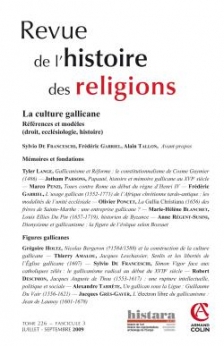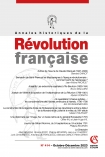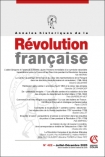
Revue de l'histoire des religions (3/2009)
Pour acheter ce numéro, contactez-nous
Recevez les numéros de l'année en cours et accédez à l'intégralité des articles en ligne.
D’emblée, les textes gallicans s’ancrent dans les profondeurs de l’histoire, une histoire qui les conduit jusqu’aux premiers temps chrétiens où ils puisent une théologie de la tradition qui détermine en aval un droit fidèle à ce moment inaugural. L’Église d’Afrique entre dans ce dispositif d’écriture et constitue un modèle latin et primitif alternatif à la papauté. L’autonomie locale, l’unité épiscopale et la procédure d’appel retiennent particulièrement l’attention des gallicans et leur permettent d’élaborer une lecture ecclésiologique qui révoque en doute la primauté juridique du siège romain. L’Église d’Afrique est ainsi un modèle pour penser l’articulation entre épiscopats locaux et unité ecclésiale universelle.
From the outset, Gallican texts are anchored in the depths of history, a history that carries them back to the earliest Christian times. The theology of tradition that they draw from this period determines that their laws shall remain ever after faithful to this origin. When the Church of Africa enters into this writing system, it serves as an alternative model, both Latin and primitive, to the papacy. In particular, the Gallicans’ attention is seized by its local autonomy, its episcopal unity and its appeal procedure, and this allows them to develop an ecclesiological reading that casts doubt on the judicial primacy of the Roman See. The Church of Africa is thus a model for understanding the relationship between local bishoprics and universal ecclesial unity.

